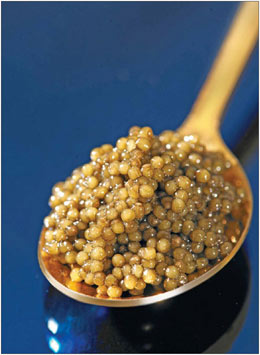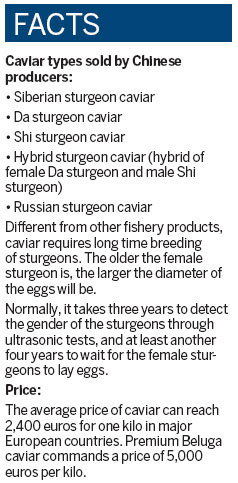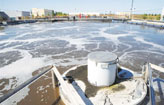Carving out a spot
Updated: 2011-04-29 10:52
By Yan Yiqi (China Daily European Weekly)
Chinese caviar making a presence in EU as supplies from Caspian Sea dwindle
Discerning gourmands from Europe are increasingly looking to China for stocking up on caviar, as the traditional markets are fast drying up and supplies dwindling. Though caviar exports are still in its infancy, experts say that there is immense potential for China to enhance its presence in the global market.
|
 China's caviar exports to the EU have risen from $1.2 million in 2007 to $5.3 million in 2010. [Provided to China Daily] |
Caviar, called the ultimate edible delicacy, has been in short supply in recent times, as most of the producers have decided to voluntarily scale down production from the Caspian Sea to check the rampant sturgeon poaching.
According to customs data, China's caviar exports to the European Union have risen from $1.2 million (840,000 euros) in 2007 to $5.3 million in 2010. The nation also accounts for nearly 20 percent of the global market for sturgeon products.
"Only four Chinese companies have been given the green light for caviar exports. Their combined annual export volume has so far not exceeded 10 tons," says Lu Xiaoping, a division chief at China's Management Office of Endangered Species Import and Export.
"We want more and more Chinese companies to enter the sector. But at the same time, they also need to pay attention to the sustainable development of the sturgeon," says Lu.
Pricing is also another reason why Chinese caviar is finding favor with European chefs. Caviar from China is normally priced around 800 to 900 euros for a kilo in the EU markets, compared with 5,000 euros for the top-selling Belugan variety.
|
 |
Although the export quota of wild caviar is strictly controlled, the global demand for caviar has been growing.
"The global demand for caviar is about 1,200 tons a year, but the supply is only 180 tons," says Lu Junshan, assistant to the president of Hunan Liangmei Sturgeon Caviar Science and Technology Co, a leading exporter from China.
Lu says his company anticipates a huge market for Chinese caviar producers. "We expect the potential market to be in the region of around 10 billion euros over the next 20 years," he says.
The Chinese hybrid sturgeon caviar is not fishy or over salted and its eggs have a pop when bitten into, says Lionel Thiolas, executive chef of Beijing Novotel.
Chinese companies started shipping farmed caviar to Europe from 2006 onwards after the UN imposed a one-year ban on Caspian Sea caviar exports.
"It was a good opportunity for us as the Caspian Sea has long been the main producer of wild caviar. But now the world's gourmets will have to be more dependent on farmed caviar," says Lu.
That the government has been lending a helping hand for caviar exports was evident when in 1998 the Chinese Academy of Fishery Science established a research center to study and promote the farming technology of sturgeons.
"Some water bodies in China are really suitable for breeding sturgeons," says Zhuang Ping, deputy chief of East China Sea Fishery Research Institute under the Chinese Academy of Fishery Science, adding that some sturgeon species are exclusive to China.
"The hybrid sturgeons, combining the qualities of both species, lay larger eggs than Siberian sturgeons, which is still the dominant species for caviar production in the world," says Lu Junshan.
He says that though European nations like Italy, Germany and France have been breeding farmed sturgeons, the lack of diversified water resources has limited their output and quality. "Almost 80 percent of European's farmed sturgeons are Siberian sturgeons, whose eggs are inferior to Chinese hybrid sturgeons."
Lu, however, admits that the processing technologies of Chinese companies are still way behind their European counterparts.
"Chinese caviar is better than Beluga caviar," says Sebastian Lepinoy, executive chef at Hong Kong's Cpage restaurant, which boasts a Michelin star.
"The water at Qiandao Lake in East China's Zhejiang province is pristine, and the sturgeons are fished every two months so your caviar is fresh," Lepinoy told the Wall Street Journal in a recent interview.
The Qiandao Lake mentioned by Lepinoy is one of the major lakes for breeding sturgeons in China. "With a forest coverage area of over 87 percent, the lake provides the perfect living environment for sturgeons," says Wang Bin, a former fishery expert at Chinese Academy of Fishery Science and now the general manager of Hangzhou Qiandao Xunlong Sci-Tech Co. Incidentally Wang's company was one of the first Chinese companies to export caviar.
Established in 2003, the company has successfully transferred from merely selling fish meat of sturgeons to production of high-end caviar. The most expensive type of caviar produced by the company can cost as much as 22,100 yuan (2,345 euros) for a kilo.
It is not just the Chinese entrepreneurs who have jumped on the caviar bandwagon. A Swiss caviar supplier has already set up shop in China for the Qiandao Lake caviar. Planet Caviar, the Geneva-based caviar supplier, has been selling exclusively a brand of Chinese caviar named "Rusalka" since 2008, says the Wall Street Journal report.
Lepinoy says that chefs are now gradually overcoming the view that China cannot produce premium and quality ingredients.
Compared to the booming overseas markets, the domestic market for caviar still remains weak.
"Although the domestic market has immense potential, it may be some time before Chinese consumers start accepting caviar as a luxury product," says Wang, "After all, only people with big incomes can really afford caviar."
Wang says his company has already started talks with some high-end hotels and restaurants in China to promote Chinese caviar.
"We believe that with proper advertising and changing consumption habits, caviar will be warmly welcomed in China as it is in European countries."
E-paper

Tapping into the future
Foreign companies are investing in China's water industry as many predict a growing profit margin.
Headhunters ride on growth
Commercial property rides wave
Learning from the past
Specials

Cuisine central
London's Chinatown is helping diners appreciate full palate of Chinese food

Tying the knot
Danish couple's high-end macrame export business takes off in the mountains of Yunnan.

Truly a super woman
Li Yuchun first came to prominence in 2005 as the Super Girl winner, and since then has become an international star.
